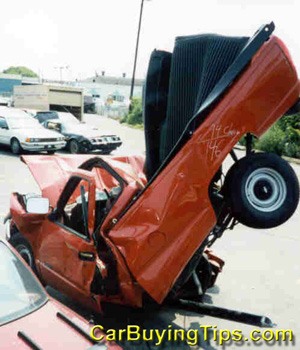Another Reason to Run a Used Car History Report
Our tips help discover a dealer selling a wrecked vehicle
For 20 years our consumer advocate team has been insisting that consumers get a detailed vehicle history report for every used car before making a purchase. You have also seen us advise that every used car should be put up on a lift for your trusted mechanic to inspect prior to buying it to rule out any visible signs of a used car lemon.
Before buying a used car, you need to read our Used Car Guide so you'll have the big picture of everything you need to know to purchase a used vehicle and avoid scams. You still need to run a vehicle history report as we tell you here, but remember this is only one piece of a much larger and complex puzzle of buying used vehicles.
A car buyer named Scott educated himself here on CarBuyingTips.com before rushing out to buy a used Toyota Corolla. He was sure glad he read our advice before heading out to shop. First, he uncovered something seedy and illegal that the car dealer tried to pull on him when attempting to sell Scott that used Toyota.
Then with the education he received here after reading our consumer guides on buying used cars, he also discovered something shocking about the car he was about to buy, we saved him a huge potential loss. What were the issues that Scott uncovered?
Federal law car dealers must obey when selling you a used car

The Federal Trade Commission's Used Car Rule requires that dealers selling used cars must post a Buyers Guide disclosure form on the window of a car before they offer the used vehicle for sale. We know that they break this rule all the time with hot air excuses to support their dirty deeds, but the FTC says that a vehicle is offered for sale when a dealer displays it for sale or lets you test drive it for the purpose of buying it.
The Buyer's guide is taken very seriously by the government and it is a violation of federal law (16 C.F.R. 455) to list a car for sale without this form attached to the window. Well, guess what, Scott discovered the dealer was trying to sell him this Toyota without that form in violation of federal law. He knew from our site to grill the salesperson about this common illegal car dealer sales practice.
What is contained in the FTC Buyer's Guide?
First, it tells you if the car is sold "as is" or if it has a warranty. It also tells you if the dealer will pay for any needed repairs. Salespeople love to verbally promise all sorts of repairs to be made to your car, "just sign here now and bring it back to us next week, we'll get it all fixed." Then they develop amnesia next week when you discover undisclosed mechanical issues and bring the car in and expect them to honor their fake verbal promises.
I have an idea, how about we make the dealer fix the things that are wrong first and then we sign! Don't sign the papers and drive off with your car until they honor their own hot air sales talk first.
The guide also warns you that oral promises are difficult to enforce and that you should get all promises in writing. You can see why some salespeople don't want you to see this advice, because now every bogus "promise" they make just to get you to sign the dotted line will have to be honored in writing.
"Oh sure, we'll give you a free set of cargo mats, just stop by on Monday and ask for Bob." The dealer is also supposed to list the known issues with the car on this form.
Lastly, the guide tells you to get a third-party inspection on the car before you buy. This is part of the very core of our used vehicle buying strategy that we tell every single consumer who lands here:
- Always run a vehicle history report on a used car before you buy it
- Have a mechanic put that car on a lift for inspection to find any issues
If you do not do these 2 steps, then do not buy the car. That is my cardinal rule for all of you. I keep pounding the tables to drive this point home, but unfortunately, not everyone listens to us and they all think nothing will happen to them.
Lucky for Scott, he indeed listened to our sound financial advice and he wondered why there was no buyer's guide on the window of that used Toyota Corolla. The salesperson lied and said, "the car just came in and we did not have time to get the form on it." We all now know they are breaking the law.
They must have that Buyer's Guide on the window before they even show you the car and they know it. The dealers usually have experts in compliance laws whose job it is to make sure these things get done.
Scott made a shocking discovery about his used Toyota
Our consumer advocate used car buying guides here trained Scott to be his own compliance officer and this scam made him even more suspicious, so he then ordered a vehicle history report just like we advise all of you to do when buying a used car.
On the vehicle history report for the used Toyota, he found even more disturbing news. Scott had performed Step #1 mentioned above from our list, and that is what saved him. He noticed on the Vehicle History Report, that the car was shipped with an exterior color of green and now he was staring a car that's charcoal gray in color.
This ominous data point made him very wary of this car. When the dealer came back with the signed buyer's invoice, Scott asked him to have "ACCIDENT-FREE" printed on the form and have it also signed by the dealer and manager and they refused to do it.
that was the end of sale right then and there, a deal breaker for our friend. Scott walked out the door. Our fellow consumer advocate friend James Bragg used to say, the reason God gave you heels is to show them to salespeople.
Scott told us "I would've never have caught this if it wasn't for this great site. You saved me from buying a car around $16,000 that was most likely in an accident. The accident was not reported because it was a personal lease from the dealer and the dealer also had the work done on the car, so they didn't have to report anything. This dealership will never see my business again."
Well said, compliance officer Scott! We hope you can learn from this as one of many examples why it is so important to run your own vehicle history report on a used car before you make the purchase. Don't rely on any laws that you think will be there to help you after the fact, because you will come up empty-handed. Buyer beware, protect yourself.

About The Author: Jeff Ostroff
A lifelong consumer advocate with over 20 years of unparalleled expertise, Jeff is the Founder, CEO and Editor-In-Chief of CarBuyingTips.com. As chief consumer advocate, he oversees a team of experts who cover all aspects of buying and selling new and used cars including leasing and financing.
For decades, Jeff has been the recognized authority on vehicle purchasing, sought out often by the media for his decades of experience and commentary, for live call-in business radio talk shows and is cited often by the press for his expertise in savvy car shopping methods and preventing consumer scams and online fraud. Jeff has been quoted in: CNN, MSNBC, Forbes, New York Times, Consumer Reports, Wall Street Journal and many more.
Jeff also has extensive experience and expertise in new car brokering and selling used cars for clients on eBay and Craigslist. Connect with Jeff via Email or on Twitter.







